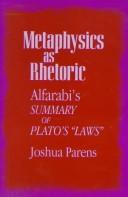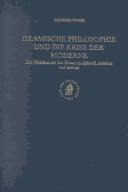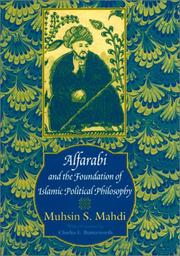| Listing 1 - 10 of 30 | << page >> |
Sort by
|

ISBN: 1438415494 9781438415499 0791425738 9780791425732 0791425746 9780791425749 Year: 1995 Publisher: Albany
Abstract | Keywords | Export | Availability | Bookmark
 Loading...
Loading...Choose an application
- Reference Manager
- EndNote
- RefWorks (Direct export to RefWorks)
Plato. --- Fārābī. --- Plato --- Fārābī.
Book
ISBN: 9780691604169 Year: 2014 Publisher: Princeton : Princeton University Press,
Abstract | Keywords | Export | Availability | Bookmark
 Loading...
Loading...Choose an application
- Reference Manager
- EndNote
- RefWorks (Direct export to RefWorks)
Widely recognized as one of the most original and profound philosophers that the medieval Islamic world produced, Alfarabi (870-950) wrote many works of political philosophy addressing the issues that dominated Greek political thought as well as new questions raised by the advent of revealed religion. Taking into account Alfarabi's major political treatises, Miriam Galston develops a theory explaining how together they form a coherent philosophy of politics. Her inquiry centers on Alfarabi's discussions of the nature of happiness, the attributes of ideal rulers, the best form of government, and the relationship between political science and theoretical inquiry. Based upon a new interpretation of Alfarabi's method of writing, Galston explores his use of dialectic, which she traces, in part, to his belief that personal discovery is a condition of philosophic understanding and to his desire to create for the reader a dialogue between Plato and Aristotle.
Book
ISBN: 1108281184 1108277829 1108278841 1108417531 Year: 2019 Publisher: Cambridge : Cambridge University Press,
Abstract | Keywords | Export | Availability | Bookmark
 Loading...
Loading...Choose an application
- Reference Manager
- EndNote
- RefWorks (Direct export to RefWorks)
Widely regarded as the founder of the Islamic philosophical tradition, and as the single greatest philosophical authority after Aristotle by his successors in the medieval Islamic, Jewish, and Christian communities, Alfarabi was a leading figure in the fields of Aristotelian logic and Platonic political science. The first complete English translation of his commentary on Aristotle's Topics, Alfarabi's Book of Dialectic, or Kitāb al-Jadal, is presented here in a deeply researched edition based on the most complete Arabic manuscript sources. David M. DiPasquale argues that Alfarabi's understanding of the Socratic art of dialectic is the key prism through which to grasp his recovery of an authentic tradition of Greek science on the verge of extinction. He also suggests that the Book of Dialectic is unique to the extent to which it unites Alfarabi's logical and political writings, opening up novel ways of interpreting Alfarabi's influence.
Dialectic --- Logic --- Islamic philosophy --- Polarity --- Polarity (Philosophy) --- Fārābī.

ISBN: 9789004453180 9789004120297 Year: 2001 Publisher: Leiden; Boston : BRILL
Abstract | Keywords | Export | Availability | Bookmark
 Loading...
Loading...Choose an application
- Reference Manager
- EndNote
- RefWorks (Direct export to RefWorks)
This book fills the gap in the research of Leo Strauss (1899 - 1973) showing the influence of Alfarabi (870 - 950), Avicenna (980 - 1037) and Averroes (1126 - 1198) on his thought. The first part is historically-philologically oriented and contains neglected material where it presents a new approach to Leo Strauss's work. The second part discusses Strauss's reaction towards the crisis of modernity, stimulated by Islamic philosophy, as well as his nomic understanding of religion as the essential features of his political philosophy. Since Alfarabi is the Muslim Philosopher who had the greatest influence on Strauss's thought, his philosophy will also be analysed. This book offers the opportunity to discover an interesting aspect of the encounter of cultures, and contribute to a modern reception of Islamic philosophy.
Islamic philosophy --- Modernity --- Rezeption --- Averroës, --- Avicenna, --- Fārābī.
Book
ISSN: 05311888 ISBN: 9782711629701 2711629708 Year: 2021 Publisher: Paris : Librairie philosophiques J. Vrin,
Abstract | Keywords | Export | Availability | Bookmark
 Loading...
Loading...Choose an application
- Reference Manager
- EndNote
- RefWorks (Direct export to RefWorks)
La pensée d’al-Fārābī joua un rôle majeur dans le développement de la psychologie philosophique médiévale. Pourtant, les lectures modernes ont souvent cantonné sa doctrine de l’âme aux problèmes eschatologiques et politiques, sans que soit envisagé ce qu’est l’âme ni comment l’homme, de substance matérielle, devient substance intellective. Ce livre s’attache à répondre à ces questions essentielles et à montrer l’originalité et la cohérence de la pensée de Fārābī, qui relie l’épistémologie, la métaphysique, la science naturelle, la logique et la politique. Cette réflexion est tout entière conduite par la volonté de penser le rapport du multiple à l’un, qu’il s’agisse de conjuguer la multiplicité des formes et puissances qui composent l’homme avec l’unité radicale de sa substance, ou de réduire la diversité des sources philosophiques en un système cohérent et unitaire qui s’insère dans le cadre de la pensée du Xe siècle abbasside.
Psychology and Philosophy --- Fārābī, Muḥammad ibn Muḥammad Abū Naṣr al --- -Psychologie et philosophie --- Fārābī, Muḥammad ibn Muḥammad Abū Naṣr al --- -Psychology and Philosophy --- -Psychology and Philosophy - Middle age --- Fārābī, Muḥammad ibn Muḥammad Abū Naṣr al- - 0870?-0950 --- Psychologie et philosophie --- Islamic philosophy --- Soul --- Philosophie islamique. --- Islam --- Fārābī --- -Islamic philosophy --- Fārābī. --- Fārābī, Muḥammad ibn Muḥammad Abū Naṣr al-
Book
ISBN: 1009116304 1009105116 1009098705 1009115103 Year: 2022 Publisher: Cambridge : Cambridge University Press,
Abstract | Keywords | Export | Availability | Bookmark
 Loading...
Loading...Choose an application
- Reference Manager
- EndNote
- RefWorks (Direct export to RefWorks)
In this book, Rasoul Namazi offers the first in-depth study of Leo Strauss' writings on Islamic political thought, a topic that interested Strauss over the course of his career. Namazi's volume focuses on several important studies by Strauss on Islamic thought. He critically analyzes Strauss's notes on Averroes' commentary on Plato's Republic and also proposes an interpretation of Strauss' theologico-political notes on the Arabian Nights. Namazi also interprets Strauss' essay on Alfarabi's enigmatic treatise, The Philosophy of Plato and provides a detailed commentary on his complex essay devoted to Alfarabi's summary of Plato's Laws. Based on previously unpublished material from Strauss' papers, Namazi's volume provides new insights into Strauss' reflections on religion, philosophy, and politics, and their relationship to wisdom, persecution, divine law, and unbelief in the works of key Muslim thinkers. His work presents Strauss as one of the most innovative historians and scholars of Islamic thought of all time.
Islamic philosophy --- Greek influences. --- Strauss, Leo --- Fārābī --- Averroës, --- Political and social views. --- Criticism and interpretation.
Book
ISBN: 0815660820 Year: 1989 Publisher: Beirut : American University of Beirut,
Abstract | Keywords | Export | Availability | Bookmark
 Loading...
Loading...Choose an application
- Reference Manager
- EndNote
- RefWorks (Direct export to RefWorks)
Multi
ISBN: 9782351595008 Year: 1994 Publisher: Presses de l’Ifpo
Abstract | Keywords | Export | Availability | Bookmark
 Loading...
Loading...Choose an application
- Reference Manager
- EndNote
- RefWorks (Direct export to RefWorks)
C'est un long cheminement qui a conduit la langue arabe de ses débuts à une expression philosophique. À partir du premier monument littéraire qui nous soit parvenu, le Coran, l'évolution a progressivement ajouté, à une langue et à une production très marquées par l'oralité, les caractères propres à l'écriture. À travers l'étude de la langue du Coran et du ḥadīṯ, à travers les disciplines religieuses comme le kalāmou le fiqh, à travers certaines formes littéraires, se sont longtemps manifestés les caractères de l'oralité. Tandis qu'avec les sciences et plus particulièrement la philosophie, les traits caractéristiques de l'écrit vont se trouver affirmés. C'est ce que cherchera à établir la seconde partie de ce travail en analysant ce que nous apporte l'œuvre de Farabi (870-950) dans sa réflexion sur le langage. Héritier des générations qui l'ont précédé, Farabi l'est aussi des grands penseurs de l'Antiquité grecque, et plus particulièrement de Platon et Aristote. Mais il réalisera une synthèse originale et posera une problématique qui lui est propre pour aborder, dans son Kitāb al-ḥurūf(Le livre des lettres), les questions de la naissance du langage et des sciences. Il en ressort un recours et un rapport au langage qui sont tout à fait différents de ceux de ses contemporains. Avec Farabi, la langue philosophique arabe est née, et cette langue a quitté le terrain de l'oralité pour celui de l'écrit. It was a long process which led the Arabic language from its beginnings to a philosophical expression. From the first literary masterpiece that was passed down to us, the Koran, evolution has progressively added, to a language and a literary output which were largely influenced by orality, characters peculiar to written tradition. It was in the study of Koranic and ḥadīthlanguages, in the religious disciplines such as kalāmand fiqhand in certain forms of literature that oral characteristics appeared for a long time pre-eminent. Whereas with sciences and more particularly…
Islamic philosophy --- Philosophy & Religion --- Philosophy --- philosophie --- Langue arabe --- Islam --- Coran --- linguistique --- Fārābī --- Language. --- Qurʼan --- Language, style.
Book
ISBN: 0809334143 9780809334148 9780809334131 0809334135 Year: 2015 Publisher: Carbondale
Abstract | Keywords | Export | Availability | Bookmark
 Loading...
Loading...Choose an application
- Reference Manager
- EndNote
- RefWorks (Direct export to RefWorks)
Rhetoric --- Aristotle. --- Fārābī. --- Avicenna, --- Averroës, --- Aristoteles. --- LANGUAGE ARTS & DISCIPLINES --- REFERENCE --- Rhetoric. --- Composition & Creative Writing. --- Writing Skills. --- Averroës, --- Fārābī. --- Rhetoric (Aristotle).

ISBN: 0226501868 Year: 2001 Publisher: Chicago ; London : University of Chicago Press,
Abstract | Keywords | Export | Availability | Bookmark
 Loading...
Loading...Choose an application
- Reference Manager
- EndNote
- RefWorks (Direct export to RefWorks)
Islamic philosophy --- Political science --- Philosophie islamique --- Science politique --- Philosophy. --- Philosophie --- Farabi --- Philosophy, Islamic --- -Administration --- Civil government --- Commonwealth, The --- Government --- Political theory --- Political thought --- Politics --- Science, Political --- Social sciences --- State, The --- Arabic philosophy --- Muslim philosophy --- Philosophy, Arab --- Philosophy --- Alpharabius --- Alfarabius --- Abennasar --- Muḥammad ibn Muḥammad al-Fārābī --- Uzluk oğlu Farâbî --- Fārābī, Muḥammad ibn Muḥammad --- Abu Nasr Mukhammad alʹ-Farabi --- Farabi, Abu Nasr Mukhammad --- Abu-Nasr alʹ-Farabi --- Abū Naṣr Fārābī --- Alfarabi --- Alfārābī, Abu Nasr --- Abu Nasr Alfārābī --- Avennasar --- Abu Nasr Forobiĭ --- Форобий, Абу Наср --- Forobiĭ, Abu Nasr --- alʹ-Farabi --- Al-Faraby --- Abu Nasr Muhammet ibn Muhammet ibn Tarhan ibn Uzlug Faraby --- Faraby, Abu Nasr Muhammet ibn Muhammet ibn Tarhan ibn Uzlug --- Abū Naṣr Muḥammad bin Muḥammad bin Ṭarhkhān bin Ūzluġ al-Fārābī --- Fārābī, Abū Naṣr Muḥammad bin Muḥammad bin Ṭarhkhān bin Ūzluġ al --- -Phwarabi, Abu Nassr --- Pharabi --- פאראבי --- أبو نصر الفارابي --- الفارابي --- فارابي --- فرابي --- Islamic philosophy. --- -Philosophy --- -Arabic philosophy --- Administration --- Abū Nasr Muhammed ibn Muhammed ibn Tarhān ibn Uzlag al-Farabi --- Fārābī --- Muhammed Ibn Muhammed (Abu Nasir) al-Farabi --- Fārābī --- Political philosophy --- Fārābī. --- al-Fārābī, Abū-Nasr Muhammad.
| Listing 1 - 10 of 30 | << page >> |
Sort by
|

 Search
Search Feedback
Feedback About UniCat
About UniCat  Help
Help News
News